|
|
|
Sort Order |
|
|
|
Items / Page
|
|
|
|
|
|
|
| Srl | Item |
| 1 |
ID:
122355
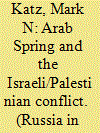

|
|
|
|
|
| Publication |
2013.
|
| Summary/Abstract |
The main impact of the Arab Spring has not been to increase, but to diminish the importance of the Israeli/Palestinian conflict for the broader politics of the Arab World.
|
|
|
|
|
|
|
|
|
|
|
|
|
|
|
|
| 2 |
ID:
126415
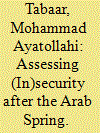

|
|
|
|
|
| Publication |
2013.
|
| Summary/Abstract |
In nearly three years, Egypt has transitioned from a large-scale uprising against one of the region's longest-standing rulers to an even more massive revolt that led to the military ousting the country's first democratically elected president, Mohamed Morsi. Between the two popular uprisings, new pacts and unlikely alliances emerged, deepened, and, in some cases, then disappeared. For its part, the army evolved from being an accomplice of the old regime, to then being an uneasy partner of the ascendant Muslim Brotherhood and, most recently, on to rebranding itself as an ally of non-Islamists and a protector of the popular will. Loosely aligned liberals, leftists, and nationalists, meanwhile, shifted from offering support for democratic elections to backing a "democratic" coup out of fear that the elected Islamists might monopolize and never relinquish power in a conservative new regime. That fear came in response to the Brotherhood's own shifting position, which moved from a commitment to "participation not domination" to a strategy of controlling the legislature and the presidency, although they were ultimately forced back into hiding before they could neutralize the judiciary and the army. And finally, the other Islamist movement, the ultraconservative Salafists, initially displayed no interest in the political process, but then mobilized and ultimately enjoyed striking success in the elections of 2011-12. Surprisingly, however, despite their presumed ideological proximity to the Brotherhood, many Salafists went on to back the military's removal of Morsi in July 2013, but then did not lend support to the interim government that was constructed in wake of Morsi's fall. In this multilayered, fast-paced political environment, mass protests, arrests, and violence have become routine.
|
|
|
|
|
|
|
|
|
|
|
|
|
|
|
|
| 3 |
ID:
134340
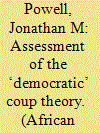

|
|
|
|
|
| Summary/Abstract |
The Egyptian military's unconstitutional removal of President Mohamed Morsi has reignited a debate regarding the theory of the ‘democratic coup’. Though coups are almost invariably condemned, many political observers and a few scholars have recently argued that coups can act as catalysts for democratisation. This paper empirically assesses the democratic coup hypothesis for Africa. Multivariate analyses from 1952 to 2012 suggest that coups statistically improve a country's democratisation prospects. Extensions of the model show that coups appear to be likely precursors for democratisation in staunchly authoritarian regimes and have become less likely to end democracy over time, and that their positive influence has strengthened since the end of the Cold War. As of 2012, countries that have experienced a recent coup are expected to be four times more likely to witness a democratic transition than those that have remained coup-free.
|
|
|
|
|
|
|
|
|
|
|
|
|
|
|
|
| 4 |
ID:
123198
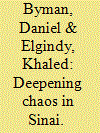

|
|
|
|
|
| Publication |
2013.
|
| Summary/Abstract |
THE GROWING instability in Egypt's Sinai Peninsula represents one of the most dangerous, and most anticipated, crises in the Middle East. Even before the 2011 Egyptian revolution, the security vacuum in the Sinai allowed criminals and terrorists, including those with an ideology akin to Al Qaeda's, to expand their operations. In the chaos after the revolution, these problems have worsened. Meanwhile, various Palestinian groups use the Sinai as a launching pad for attacks against Israel.
|
|
|
|
|
|
|
|
|
|
|
|
|
|
|
|
| 5 |
ID:
124752
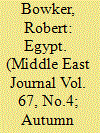

|
|
|
|
|
| Publication |
2013.
|
| Summary/Abstract |
Pressure for change at all levels - individual, family, and state - preceded the 2011 Arab uprisings. It will continue, driven by inexorable factors including demography, education, Internet-based connectivity among like-minded groups, wage-based employment of women, and changing business models. The following analysis of the Egyptian case provides a background for understanding Egypt's challenges in the wake of President Mohamed Morsi's July 2013 ousting and the military's takeover.
|
|
|
|
|
|
|
|
|
|
|
|
|
|
|
|
| 6 |
ID:
128170


|
|
|
|
|
| Publication |
2012.
|
| Summary/Abstract |
The failure of Egypt's new leaders to address the needs and aspirations of young people means the youth-led revolution, soon to enter its third year, will not stop until real change is achieved.
|
|
|
|
|
|
|
|
|
|
|
|
|
|
|
|
| 7 |
ID:
129214
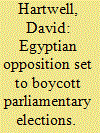

|
|
|
| 8 |
ID:
118646
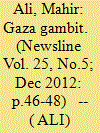

|
|
|
| 9 |
ID:
137335
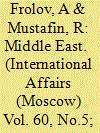

|
|
|
|
|
| Summary/Abstract |
The Ukrainian crisis eclipsed the Middle East and the Arab revolutions which, however, have not disappeared without trace. Seemingly identical and deceptively monochrome, they rolled across the Arab world revealing their specifics and bringing very different results ranging from a backtrack revolution in Egypt to chaos and instability in Libya, from the regime's firmer grip on power in Yemen, to what looks like chronic confrontation in Syria and a complete failure in Bahrain. The Middle East has come close to the threshold of modernization of social relations and the style of governance, even though there is a widely accepted opinion that in 2013 the revolutions exhausted their vigor.
|
|
|
|
|
|
|
|
|
|
|
|
|
|
|
|
| 10 |
ID:
126234
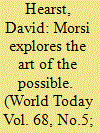

|
|
|
| 11 |
ID:
118654


|
|
|
| 12 |
ID:
116108


|
|
|
|
|
| Publication |
2013.
|
| Summary/Abstract |
Two years after the outbreak of what has come to be known as the Arab Spring, the bloom is off the rose. Fledgling democracies in North Africa are struggling to move forward or even maintain control, government crackdowns in the Persian Gulf and elsewhere have kept liberalization at bay, and Syria is slipping ever deeper into a vicious civil war that threatens to ignite the Middle East. Instead of widespread elation about democracy finally coming to the region, one now hears pessimism about the many obstacles in the way, fear about what will happen next, and even open nostalgia for the old authoritarian order. Last June, when the Egyptian military dismissed parliament and tried to turn back the clock by gutting the civilian presidency, The Wall Street Journal's chief foreign policy columnist cracked, "Let's hope it works." (It didn't.) And Egyptian President Mohamed Morsi's attempted power grab in November made such nostalgia commonplace.
|
|
|
|
|
|
|
|
|
|
|
|
|
|
|
|
| 13 |
ID:
125165
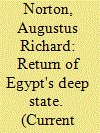

|
|
|
|
|
| Publication |
2013.
|
| Summary/Abstract |
Not only was the paramount role of the military unimpeded after the exit of Mubarak, but other key institutions were undiminished in their power.
|
|
|
|
|
|
|
|
|
|
|
|
|
|
|
|
| 14 |
ID:
130680
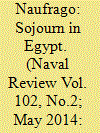

|
|
|
| 15 |
ID:
132150
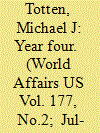

|
|
|
|
|
| Publication |
2014.
|
| Summary/Abstract |
Shortly after the Arab Spring broke out at the tail end of 2010, two narratives took hold in the West. Optimists hailed a region-wide birth of democracy, as though the Middle East and North Africa were following the path blazed in Eastern Europe during the anti-communist revolutions of 1989. Pessimists fretted that the Arab world was following Iran's example in 1979 and replacing secular tyrants with even more repressive Islamist regimes.
|
|
|
|
|
|
|
|
|
|
|
|
|
|
|
|
|
|
|
|
|